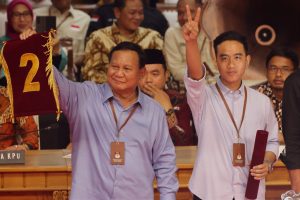In the latest batch of opinion polling on Indonesia’s upcoming election, Defense Minister Prabowo Subianto has opened up a significant lead over his closest rivals ahead of the opening of the official campaign period.
In the latest poll by Indikator Politik Indonesia, released on Sunday, Prabowo was the preferred selection of 40.6 percent of respondents, compared to 27.8 percent for Ganjar Pranowo, the former governor of Central Java and the candidate of the ruling Indonesian Democratic Party of Struggle (PDI-P). Anies Baswedan, the former governor of the capital Jakarta was a distant third, with 23.7 percent.
The survey of 1,220 people was conducted between October 27 and November 1, shortly after Prabowo announced Gibran Rakabuming Raka, the 36-year-old son of President Joko “Jokowi” Widodo, as his vice-presidential running-mate.
The IPI survey came a few days after another by Poltracking Indonesia, which showed Prabowo sitting on 41.7 percent support, compared to 31 percent for Ganjar and 25.7 percent for Anies.
Gibran’s entrance into the race has been a subject of heated debate in Indonesia. He was only able to put forward his candidacy after a Constitutional Court ruling in mid-October that created a bespoke exception to the minimum age requirement of 40, allowing candidates who have served in elected office at the regional level to run as president and vice-president. Gibran has served as mayor of Surakarta, a post once occupied by his father, since 2021.
Critics of the ruling – and there were many – focused on the fact that the chief justice of the Constitutional Court was none other than Jokowi’s brother-in-law, who was eventually forced to stand down by an ethics panel for failing to recuse himself from the case. While Jokowi initially showed signs of backing the PDI-P’s chosen candidate, the appointment of his son has been widely seen as an implicit endorsement of Prabowo, to the extent that Anies and Ganjar felt the need to publicly call on the president to remain neutral during a meeting with him late last month.
Surveys conducted in September, prior to the court ruling, showed a much narrower gap between Prabowo and Ganjar, in some cases with the latter in the lead. The more recent polling would seem to suggest that the appointment of Jokowi’s son has benefited Prabowo’s chances of winning election to the top office, after defeats to Jokowi in both 2014 and 2019. Indeed, Jokowi has enjoyed sky-high approval ratings through most of his two terms in office, and while Jokowi has not formally endorsed any candidate, the transmission of Jokowi’s popularity to Prabowo via his son could carry significant weight in the upcoming election.
However, a poll conducted by Charta Politika between October 26-31, shortly after the Gibran announcement, showed Ganjar in the lead. As per Reuters’ reporting, the survey also “showed some dissatisfaction about outgoing leader Joko Widodo’s role in the presidential race” – namely, the perception that he had used his influence over the Constitutional Court to maneuver his son onto Prabowo’s ticket.
Nearly half of respondents felt that Gibran would be unsuitable for vice president, while 59 percent said they “disagreed with political dynasties.”
The varying poll results could be chalked up to statistical noise, but they may also reflect the high stakes gamble that Jokowi and Prabowo have made in appointing Gibran. If things work out, both leaders will benefit: Prabowo will be able to tap into the wild popularity of the man who bested him twice in presidential ballots, hoping thereby to win the political prize that has eluded him for years, while Jokowi will use a putative Prabowo administration as a means of ensuring that his political power, and his economic and political legacy, persist once he leaves office.
“In attaching his son to Prabowo’s ticket, Jokowi obviously sees it as the most feasible way to achieve his political goals,” Nathanael Gratias Sumaktoyo of the National University of Singapore wrote this week in New Mandala.
But Sumaktoyo argued that Jokowi’s gamble could easily backfire. First, by implicitly backing Prabowo, he has “practically abandoned” the PDI-P, under whose banner he ran at the 2014 and 2019 elections, leaving him without a political vehicle once he leaves office. Second, “it is not at all clear how Jokowi thinks he can persuade a military man to do his bidding once he is outside the circle of power,” given his lack of control of a grassroots political machinery.
With the official campaign period set to open on November 28, the polls will likely see many more turns before election day. But one gets the impression that its outcome could have far-reaching impacts on the legacy of two of the country’s most prominent political personalities.

































